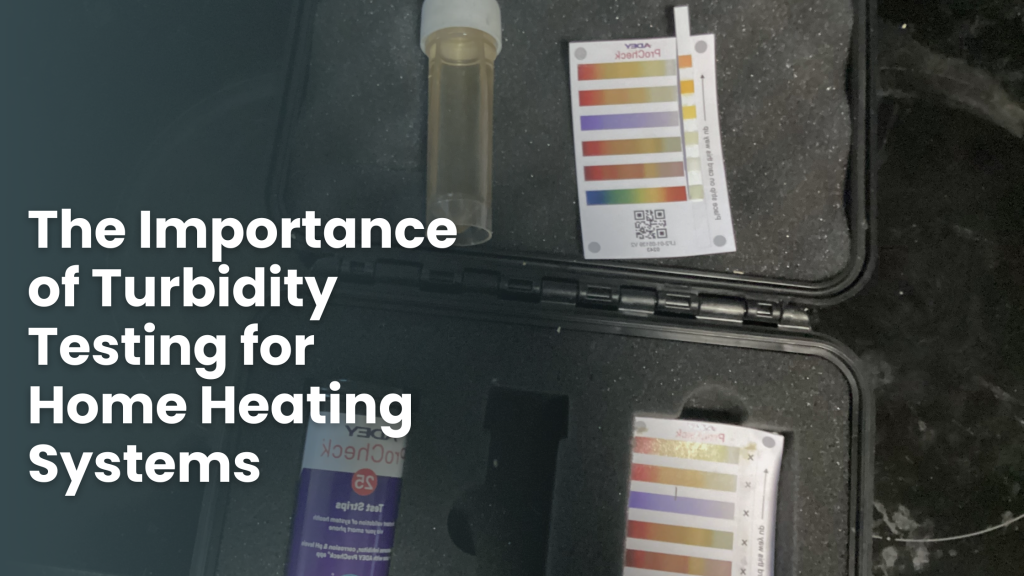
“Things just aren’t made to last anymore.”
This seems to be a common statement when it comes to household appliances, including boilers. Whilst that can be true with some appliances – we find when it comes to the life of your boiler and heating system- there are things you can do to be proactive and ensure longevity.
Buying and installing a new boiler or heating system comes with a significant spend so it makes sense that you would want to ensure its efficiency for many years.
We find a lot of people only get in touch when the damage is done, and things go wrong. Yet there is a lot you can do, right from the start, to ensure your boiler keeps working efficiently. One of them is a yearly service, the other is having a regular turbidity test.
What is Turbidity Testing?
We don’t often think about the quality of our water in relation to our appliances, yet the quality of the water circulating within your system can make a huge difference to its functioning.
Here in the UK, where heating systems are an essential part of comfortable living, understanding the importance of turbidity testing is key for homeowners seeking to protect their investments.
Turbidity testing involves measuring the clarity of water by assessing the suspended particles present in the system. In the context of heating systems, this test reveals the level of impurities such as rust and magnetite sediment that can accumulate in the water over time. These impurities, if left unchecked, can wreak havoc on heating systems, leading to inefficiency, breakdowns, and costly repairs.
The Perils of Poor Water Quality
Imagine your heating system as a circulatory system, with water acting as its lifeblood. Just as impurities in our bloodstream can harm our health, contaminants in heating water can severely affect its performance.
Here’s how:
- Reduced Efficiency: When the water in your system is full of impurities, it becomes less effective at transferring heat. This means your boiler needs to work harder to achieve the desired temperature, resulting in increased energy consumption and higher bills.
- Corrosion: Rust and magnetite in the water can corrode the internal components of your heating system, leading to leaks, blockages, and ultimately, system failure. Corrosion weakens pipes, valves, and radiators, shortening their lifespan and causing costly replacements.
- Clogging: Sediment build-up in pipes and radiators restricts water flow, causing uneven heating throughout your home. Cold spots, noisy pipes, and inefficient heating are common symptoms of clogged systems, which can be both disruptive and expensive to rectify.
- Boiler Damage: Perhaps most concerning of all is the potential damage to your boiler itself. Sediment accumulation in the boiler’s heat exchanger can impede heat transfer, causing overheating, pressure issues, and ultimately, boiler breakdown. Replacing a boiler is a significant expense that can be avoided with proper maintenance, including regular turbidity testing.
The Benefits of Turbidity Testing
So, why is turbidity testing essential for homeowners? Here are a few reasons:
- Preventative Maintenance: By identifying and addressing water quality issues early on, you can prevent costly repairs and extend the lifespan of your heating systems.
- Improved Efficiency: Clean water ensures optimal heat transfer, leading to increased energy efficiency and lower heating bills.
- Peace of Mind: Regular turbidity testing provides reassurance that your heating system is operating at peak performance, keeping your home warm and comfortable throughout the year.
- Long-Term Savings: Investing in turbidity testing is a small price to pay compared to the potential costs of repairing or replacing a damaged heating system. It’s a proactive measure that can save you money in the long run.
As you can see, having a regular turbidity test alongside a yearly service is a small price to pay for peace of mind and ensure your heating system is working effectively and efficiently throughout the year.
By understanding the importance of water quality and taking proactive steps to maintain it, you can safeguard your investment, enhance system performance, and enjoy uninterrupted comfort for years to come.
Don’t wait for things to go wrong – get in touch to schedule a turbidity test for your heating system today.

